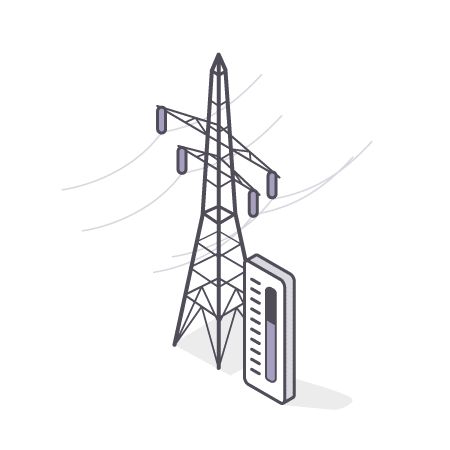Exposure to electromagnetic fields in my municipality
MANAGING ELECTROMAGNETIC FIELDS
In the city
The digital transition we are witnessing is giving rise to a debate on the impact of electromagnetic fields on health. Lack of knowledge of their long-term effects has prompted the government to define best practices aimed at protecting the most sensitive populations.
However, at a time when communications infrastructures are being rolled out to meet the needs of local residents, municipalities are seeking to effectively integrate the environmental health dimension of electromagnetic fields into their digital development strategies.
Regulations
Do you want to ensure that your infrastructure complies with the regulations in place to guarantee the safety of your residents? Check that your antennas, public Wi-Fi networks, electric charging points, etc. comply with exposure limits?
Network deployment
Are you facing questions from some of your citizens? Do you want to ensure that digital infrastructures are deployed appropriately throughout your territory to manage exposure while avoiding white zones that increase exposure to mobile terminals?
Environmental health
Are your citizens concerned about the potential long-term effects of their exposure to electromagnetic fields? Do you want to implement a relevant policy to deal with the complex and sometimes contradictory challenges of exposure to transmitters and mobile terminals?

MANAGING ELECTROMAGNETIC FIELDS
Exem's response
As experts in electromagnetic environments, we attach primordial importance to managing exposure to electromagnetic fields. With our EMF City Management offer, we support public authorities in defining their risk management policy. Our offer is based on three pillars:
- understanding the network and exposure to electromagnetic fields
- optimising digital development and enhancing property assets
- monitoring and controlling electromagnetic exposure and coverage
01
Understanding the network & exposure
Gain a better understanding of the impact of telecommunications networks on our overall exposure, made more complex by the duality between antennas and mobile terminals, which require compromises.
02
Digital development & valorisation of real estate
Play an active role in the roll-out of infrastructure in your area by enhancing your real estate assets to optimise network coverage and the day-to-day exposure of your citizens.
03
Measuring exposure & coverage
Adopt a global approach to control exposure over your territory by monitoring infrastructure emissions, while guaranteeing sufficient coverage for users of mobile terminals, which emit more electromagnetic fields in poor coverage situations.
Download our white paper on public exposure to electromagnetic fields
MANAGING ELECTROMAGNETIC FIELDS
The EMF City Management offer in detail
Taking enlightened decisions about the deployment of new telecommunications infrastructures, identifying sensitive areas that require special attention, implementing appropriate precautionary measures through monitoring and supervision, comparing your situation with other similar municipalities to encourage the exchange of best practice, and highlighting your initiatives through better communication are among the measures you should adopt.


EMF Supervision
Our EMF Supervision solution makes it possible to monitor changes in exposure levels, particularly in relation to the deployment of antennas. Deployed on a town-wide scale, such a system demonstrates the determination of elected representatives to provide transparency to citizens and to act in accordance with the recommendations of ANSES.

EMF City Map
Our measurement system enables you to map electromagnetic field exposure across your entire territory by bike, using an eco-responsible approach. We use the measurements on our EMF City Management platform to provide a global overview and take coherent action as part of your environmental health policy.

EMF Fly Over
Our measurement system embedded on a drone allows us to quickly explore areas that are difficult to access. For example, we can detect potential atypical points in housing by flying over the front of a building. From the flight plan to the necessary authorisations, our offer is fully integrated.

EMF City Campus
Our training courses give you the opportunity to understand the influence of telecommunications networks on exposure to electromagnetic fields, thanks to interactive educational workshops and flexible training resources. We place particular emphasis on exposure related to infrastructures and mobile terminals, to provide an in-depth understanding of the sometimes complex challenges involved.

Low-frequency wave measurements
Mayors can benefit from a system for measuring low-frequency electromagnetic fields, particularly for high-voltage lines. As soon as the service is financially covered by RTE, we organise the measurements with the mayor's office and forward the measurement report.

EMF City Planner
EMF City Planner is a unique platform that enables you to enhance the value of the real estate in your area by identifying buildings that are suitable for hosting radio sites, infrastructure that has already been deployed and specific buildings housing sensitive populations, so that you can hold informed discussions with stakeholders in the digital sector.

Network City Map
In addition to our exposure mapping solution, we map the network coverage of the national operators to ensure that it is uniform and that all users have the same conditions for using their mobile phones. The more a phone is covered by the network, the fewer electromagnetic fields it emits.

Examination of “Town Hall Information Files”
We support public authorities in drawing up summary sheets that comply with regulatory requirements, and in examining the “Town Hall Information Files” supplied by the operators of radioelectric sites, whether for a new site or a substantial modification.

Radio frequency measurements
When it comes to public exposure to electromagnetic fields, mayors play a vital role. They can benefit from the French National Frequencies Agency (ANFR), which mandates our laboratory to carry out electromagnetic field measurements in places open to the public (schools, nurseries, etc.).
We can help you
"*" indicates required fields
UNDERSTAND EVERYTHING
FAQs
Here you’ll find answers to the questions you, as a municipality, frequently ask about public exposure to electromagnetic fields in your city.
Radio frequencies, emitted by antennas, Wi-Fi hotspots, connected objects, etc., are the main electromagnetic fields present in public places, streets and public transport. The regulations in place define recommended levels and maximum exposure thresholds for each source. The ANFR (French National Frequencies Agency) lists all the radio transmitters and the values measured in France on its website www.cartoradio.fr.
In order to comply with the regulations, establishments open to the public must respect the exposure limit values (Decree no. 2002-775 of 3 May 2002)from the public to electromagnetic fields. To ensure compliance with these standards, all municipalities have the right to ask for measurements to be funded by the ANFR.
For precise information on the levels of exposure to electromagnetic fields in your local area, we recommend that you contact the French National Frequencies Agency (ANFR), which will commission an independent laboratory to carry out measurement campaigns in your area.
It is important to note that levels of exposure to electromagnetic fields can vary depending on location, the density of antennas and other environmental factors. Measurements specific to your locality are therefore recommended, as opposed to national averages.
Spot measurements carried out in accordance with the ANFR protocol provide official results and, depending on the case, a precise analysis of the contributors. However, it is not possible to monitor changes in the situation over time, which will obviously change as new antennas are deployed. Monitoring levels with a tool such as the EMF Observatory provides a temporal view, but also enables transparent communication with the public.
Effective collaboration with telecommunications operators and other stakeholders must be based on mutual respect, transparency and the search for balanced solutions that take into account both connectivity needs and the protection of public health. It is therefore advisable to enlist the help of experts to draw up an Operator Charter and implement preventive measures. For example, it is possible to:
- Establish a constructive dialogue with telecoms operators, regulatory authorities, public health experts and other relevant stakeholders,
- Organise regular meetings to discuss the issues, concerns and measures to be taken to ensure responsible management of exposure to electromagnetic fields,
- Involve telecoms operators in the urban and land-use planning phases,
- Encourage a coordinated approach to determining appropriate areas for the deployment of telecommunications infrastructures, taking into account coverage needs as well as sensitive areas such as schools, hospitals and parks,
- Organise information sessions, workshops or awareness campaigns to share factual information and answer residents’ questions.
“EMF stands for “Electromagnetic Field” while “EMC” mean “Electromagnetic Compatibility”. Electromagnetic Compatibility refers to the ability of electronic devices to operate without mutual interference in the presence of electromagnetic fields.
This is essential to avoid malfunctions and safety problems. Standards are in place to ensure that acceptable levels of interference are respected.
